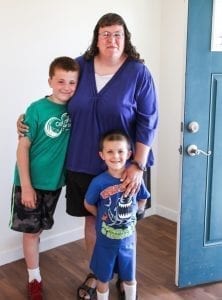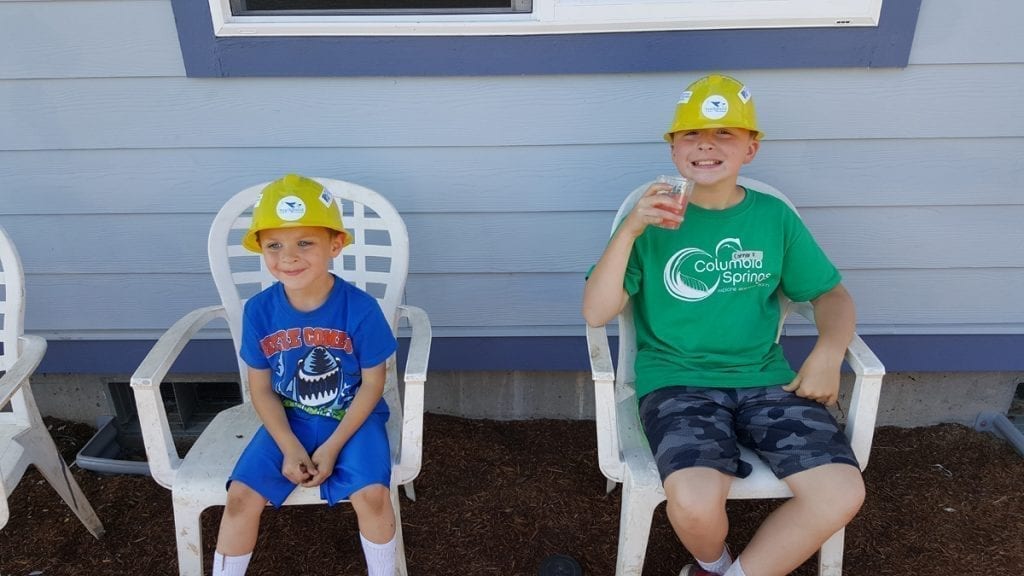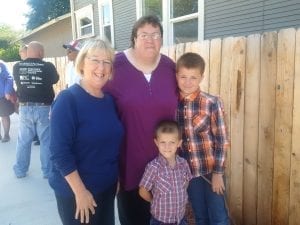VANCOUVER — Sitting inside Melinda Patterson’s cozy Vancouver home, looking at the shelves of children’s videos and framed photos of her two young sons, it’s hard to believe that just a few years ago this picture was very, very different.
“When Connor, my first son, was about 4 or 5 years old, I was homeless,” Patterson, 38, remembers. “And we ended up in a shelter … then I got pregnant again and I had Tristan, my youngest, while I was living in the Hazel Dell shelter.”

Flash forward four years and Patterson has been through the type of instability most mothers living in the U.S. can’t fathom — unable to work due to physical disabilities, Patterson struggled to make ends meet and take care of her sons. She stayed in shelters, moved into low-income housing in a Vancouver apartment complex and eventually qualified for disability payments, which gave her enough of an income to buy food and basic necessities for her family, but didn’t allow her to pay the types of rents that most Vancouver-area apartments charge these days.
It hadn’t always been this way for Patterson. Born in Seattle, she grew up surrounded by family, including her mother, whom she’s still close to, her twin sister, two other sisters and a brother. In 1989, her father died and the family relocated to Portland, where Patterson attended Roosevelt High School. Although she didn’t earn her high school diploma, Patterson found a job helping people as a caregiver and worked on getting her GED.
Things were going OK for awhile, but then job losses and pregnancies and failed relationships and the economic downturn happened, and, by 2011, Patterson found herself pregnant, with a 5-year-old son, living in a shelter and unable to pull her life back together.
The birth of her son, Tristan, in 2012, was bittersweet. Patterson loved her new baby, but suffered from postpartum depression and was still struggling to make ends meet. So, when a pastor from her church suggested putting the baby into temporary foster care until Patterson got through her postpartum depression, she agreed.
“Then I found out that they wanted to take Connor away, too,” Patterson says, shaking her head at the memory of Children’s Protective Services (CPS) workers showing up at her home and asking her to please not cry in front of her son while they gathered his things and took him away from his mother.
“It had just been me and him for so long,” Patterson says. “That was really hard. How was I supposed to not cry?”
In the weeks that followed, Patterson’s family jumped into action. Her mother, who lives near Battle Ground, was able to take Connor, then about 6 years old, into her home until Patterson could get better mentally and prove to CPS that she was able to provide a safe home for her boys. CPS placed Tristan, who was just a few months old at that point, with a foster family in the Vancouver area.
“I had to go to parenting classes and through counseling,” Patterson recalls. “Eventually, Connor came home, but it took a lot longer for Tristan. I had no job, no home, and I was trying to figure out what I needed to do to have both of my sons back with me.”

After more than a year of counseling, going to parenting classes, working to get her GED, becoming eligible for disability benefits and finding subsidized housing in Vancouver through Second Step Housing — a Vancouver nonprofit that advocates for longer-term housing solutions for the area’s homeless women and children — Patterson finally had her two sons back in her life. But the future was still very uncertain.
“I had a two-year voucher for my apartment and I was able to get back on my feet,” Patterson says.
But what would happen once the voucher expired and Patterson was forced to pay 100 percent of her rent instead of just a portion?
“I wouldn’t have been able to do it,” she says. “I was paying $651 for a two-bedroom apartment and if I’d had to pay without the voucher, it would have been $1,000. I couldn’t have stayed where I was, and I probably would have had to move all three of us into a one-bedroom … if I could have even found a one-bedroom that I could afford.”
One month before her voucher was set to expire, Patterson’s social services caseworker from the Second Step Housing approached her with an idea: Had she ever considered the Evergreen Habitat for Humanity’s house ownership program?
“I’d never even heard of it,” Patterson says. “But she said, ‘Why don’t you go and see if you qualify?’ So I did.”
In 2013, Patterson discovered that hers was one of five families selected for Evergreen Habitat for Humanity houses.
A unique homebuilding nonprofit that helps individuals and families own their own home after putting in so many hours of “sweat equity” — typically labor during the home’s construction phase, but in Patterson’s case, because of her physical disabilities, the sweat equity consisted of 500 hours’ worth of office work — Habitat for Humanity has helped low-income families become homeowners in 1,400 communities and 70 countries throughout the world.

At the local level, the Evergreen Habitat for Humanity has built 33 homes in Clark County since 1991 and served 120 individuals, including 73 children. The local Habitat selects homeowners based on need and willingness to partner with the nonprofit, as well as on their ability to pay the zero-interest, low-cost mortgage payments. Families must demonstrate that their current housing does not meet their needs — due to being unaffordable or in an unsafe area to raise children — and must verify that their annual household income falls between 30 and 60 percent of the median income.
Once she qualified for a Habitat home and started working on her 500 sweat equity hours, Second Step helped Patterson keep her subsidized rent at the Vancouver apartment complex where she had been living with her sons. In September, the family finally moved into their completed Habitat home, located off Mill Plain Boulevard in Vancouver’s Hudson Bay neighborhood.
Patterson says the feeling of relief that flooded through her after she and her boys settled into their new home — a home they own — was unbelievable.
“It’s so hard to believe,” she says. “I never thought I would be a homeowner. And I’m still getting used to it. I think about how we were bouncing from shelter to shelter to apartments, to, now, this, our own home … and I don’t have to worry ‘What’s going to happen next?’ We have some stability. And I’m very thankful to everyone who helped make this happen.”
Since moving into the new home, Patterson has enrolled her sons in elementary and preschools close by and says she has the time to concentrate on her own future now, too.
“I know that I can’t go back to caregiving, because of my disabilities, it’s just too much, but I do like helping people and working with people, so I’m thinking about maybe going to Clark College and taking some classes,” Patterson says. “I’d like to work in an office setting. I’d love to work with something like Habitat … I really enjoyed working there for my ‘sweat equity.’”

For now, though, Patterson is concentrating on helping her sons feel safe and secure in their new home and new schools. That means frequent trips to nearby playgrounds when the weather cooperates, volunteering at their schools whenever she can, participating in after-school events and making the holidays feel special again.
For Thanksgiving, Patterson has invited her mother to her new home and is making Thanksgiving dinner for her mom and her two young boys. For Christmas, she’s hoping to have her family over and to invite her girlfriend of eight years, Jen, down to Vancouver from her home in Alaska for the holiday break. The thought of the holidays and of spending them in a stable environment makes Patterson feel happy — and that’s something she says she hasn’t felt too easily over the past few years.
“It was so stressful,” she says of her struggle with homelessness and joblessness. “Now, the kids are in school, they’re making friends with the neighbors and we’re in our own house … yeah, I’m happier now. … And I’m just feeling grateful. Grateful to be alive. Grateful to be with my kids. Grateful to be a homeowner. Just grateful for having this chance.”





So sad to see my twin sister Melinda Eve Patterson is still someone that continues to use all and any others for her benefit even along using her own children.. Hope one day this loser alongside the rest of her older sisters who who where they are now in 2021, all are given there own justice and own karma in 2022..